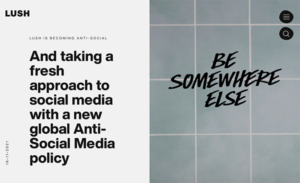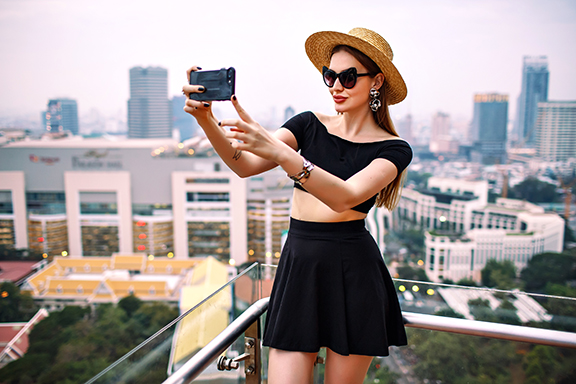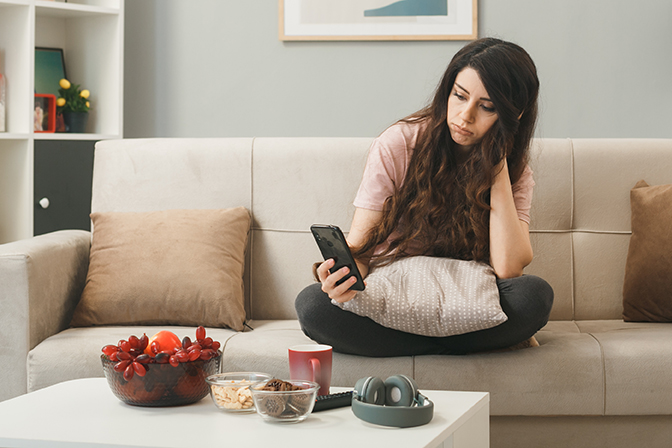How do social networks affect our self-esteem?
Many people feel the need for approval on social networks and the positive reinforcement system used by these platforms generates a certain addiction to their use and obvious psychological consequences: likes and self-esteem, self-esteem and likes. In the case of influencers, who have found in social networks a profession, their permanent exposure to the scrutiny and approval of their fans through likes and the negative criticism of their haters generates in them consequences in their self-esteem in many cases irreparable.
As we say the search for likes and the need for approval on social networks can even cause catastrophic effects. In September 2017 the tragic goodbye of Celia Fuentes, a girl with an apparently desirable life for everyone, showed us that this "apparently" was just that, a mere appearance. Celia was a hugely successful influencer on Instagram, but her digital exposure affected her self-esteem and she suffered continuous depressions that led her to attempt to take her own life on several occasions until, finally, she succeeded.
The impact on influencers' self-esteem

 This unsustainable psychological pressure for the search of likes, which directly affects the self-esteem of content creators, has led to numerous celebrities who have decided to close their social network accounts and countless have had to interrupt their activity for a while.
This unsustainable psychological pressure for the search of likes, which directly affects the self-esteem of content creators, has led to numerous celebrities who have decided to close their social network accounts and countless have had to interrupt their activity for a while.
Among those who have definitively abandoned them, the case of Pamela Anderson, the famous beach lifeguard, who closed her Twitter, Facebook and Instagram accounts (1.2 million followers) giving advice to her followers "Try not to let yourselves be seduced by wasting time. That's what THEY want and can use to make money and control your brain."
Guadiana Celebrities
 Regarding the Guadiana celebrities, who disappeared from social networks for a while and came back, in most cases they did it motivated by mental health reasons: Britney Spears, Sandra Bullock, Daniel Radcliffe, Keira Knightey, Julia Roberts, Selena Gomez -who in December 2020 revealed her addiction to social networks, depression and anxiety disorders, and has launched Wondermind. An initiative to support mental health education - Tom Holland, Justin Bieber, Taylor Swift, Charli D'Amelio.... And in the national scene there have also been very well known digital hiatuses of El Rubius, Dulceida, Laura Escanes, Sara Sálamo, Marta Pombo, Sophie Tatar, Daniel Marrero, Tamara Gorro…
Regarding the Guadiana celebrities, who disappeared from social networks for a while and came back, in most cases they did it motivated by mental health reasons: Britney Spears, Sandra Bullock, Daniel Radcliffe, Keira Knightey, Julia Roberts, Selena Gomez -who in December 2020 revealed her addiction to social networks, depression and anxiety disorders, and has launched Wondermind. An initiative to support mental health education - Tom Holland, Justin Bieber, Taylor Swift, Charli D'Amelio.... And in the national scene there have also been very well known digital hiatuses of El Rubius, Dulceida, Laura Escanes, Sara Sálamo, Marta Pombo, Sophie Tatar, Daniel Marrero, Tamara Gorro…Exodus of brands
Today, brands assume that their relationship with the consumer transcends the commercial to become something much more personal: they aspire to be travelling companions throughout the lives of their consumers and to this end they personify themselves through values and a purpose that they try to make visible through concrete actions. Naturally, social networks are facilitators.
 In the case of Lush, an international handmade cosmetics company, it announced that it was abandoning Facebook, Instagram, WhatsApp, Snapchat and TikTok. In its statement, Jack Constantine, CDO & Product Inventor at Lush states that "we wouldn't ask our customers to meet us in a dark and dangerous alley, but some social media platforms are starting to feel like a place no one should go," at least until these platforms can provide a safer environment for their users. The brand feels compelled "to take our own measures to protect our customers from the harm and manipulation they may experience when connecting with us on social networks." Lush has opted to maintain its activity on YouTube and Pinterest as channels to inspire its consumers, and with Twitter as an online customer service channel.
In the case of Lush, an international handmade cosmetics company, it announced that it was abandoning Facebook, Instagram, WhatsApp, Snapchat and TikTok. In its statement, Jack Constantine, CDO & Product Inventor at Lush states that "we wouldn't ask our customers to meet us in a dark and dangerous alley, but some social media platforms are starting to feel like a place no one should go," at least until these platforms can provide a safer environment for their users. The brand feels compelled "to take our own measures to protect our customers from the harm and manipulation they may experience when connecting with us on social networks." Lush has opted to maintain its activity on YouTube and Pinterest as channels to inspire its consumers, and with Twitter as an online customer service channel.Bottega Veneta, the Italian fashion brand specialising in fur and leather, abandoned social media in January 2020 and in June Balenciaga also moved completely away from Instagram.
A network like no other
As we have seen, social networks were not designed to take care of people, however, ēllu was. That is one of the purposes of our brand that makes us a network different from all others: to protect the physical and mental health of our users and, consequently, their self-esteem, disconnecting them from the massive search for likes.
Far from trying to provoke an addiction to a platform, ēllu provides a private communication environment, safe and just as fun as that of other social networks, bringing the values of interpersonal communication to the digital world like no other.








